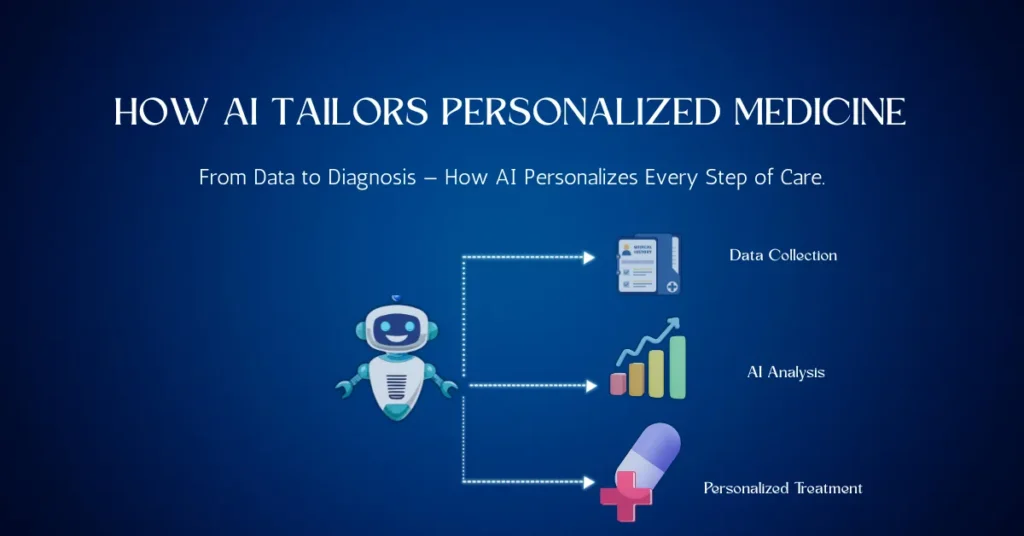Introduction: The Impact of AI in Personalized Medicine
Imagine a world where your treatment plan is as unique as your DNA—this is the future of AI in Personalized Medicine. AI is making this vision a reality, changing healthcare by shifting from one-size-fits-all treatments to solutions tailored to each individual. By analyzing a patient’s genetic makeup, lifestyle, and health data, AI helps doctors offer care that is more precise, effective, and safer.
AI processes vast amounts of data, transforming how we diagnose, treat, and prevent diseases. It’s not just about faster care—it’s about better care designed for you. As AI advances, it will continue to revolutionize personalized medicine, creating a more efficient, tailored, and patient-centered healthcare experience.
Fundamentals of AI in Personalized Medicine
What is Personalized Medicine?
Personalized medicine takes healthcare beyond the generic “one-size-fits-all” model. By using a patient’s genetic makeup, lifestyle choices, and environmental factors, it customizes treatment strategies specifically for that individual. This approach leads to more accurate treatments, fewer side effects, and overall better results for patients.
AI’s Role in Personalized Healthcare
AI is revolutionizing personalized medicine by sifting through enormous datasets—from genetic sequences to patient history—to identify patterns and insights that would be impossible for a human to detect. This data-driven approach allows doctors to make highly informed decisions, optimizing treatments for each person’s unique health profile.
Examples of AI in Personalized Treatment
AI’s influence is already evident across various medical fields. In oncology, AI analyzes genetic mutations in tumors to identify the most effective targeted therapies, improving precision medicine in cancer care. In diabetes management, it predicts insulin needs through real-time glucose monitoring, delivering accurate, personalized treatment recommendations. These real-world applications are just the beginning of how AI is reshaping the landscape of personalized healthcare, ensuring patients receive tailored, evidence-based care for their unique conditions.
AI and Genetic Data in Personalized Medicine
AI and Genetic Markers
AI is transforming how we use genetic data to assess health risks. By analyzing genetic markers, AI can predict the likelihood of developing conditions like cancer, cardiovascular disease, or diabetes. This early detection allows healthcare providers to recommend proactive, personalized treatment plans based on an individual’s genetic profile, improving patient outcomes and minimizing the risk of serious health issues.
Personalized Genetic Therapy with AI
AI is also advancing personalized genetic therapies. By leveraging genetic sequencing and AI-driven insights, doctors can pinpoint the best treatments for genetic disorders. With technologies like CRISPR gene editing, AI enables more targeted interventions that address the root causes of inherited diseases. This personalized approach is offering new hope for treating genetic conditions that were once considered untreatable, providing tailored solutions for individual patients.
AI in Personalized Medicine: Precision and Accuracy at the Core
AI-Powered Healthcare Solutions
AI is changing how doctors provide care by creating treatment plans that are customized for each patient. By analyzing large amounts of data, AI helps doctors choose the most effective treatments, ensuring better results and fewer side effects. This means patients get care that’s specifically designed for them, improving their overall health outcomes.
Machine Learning in Personalized Healthcare
Machine learning is revolutionizing diabetes care by making treatment more personalized. Continuous glucose monitors (CGMs) track a patient’s blood sugar levels in real-time, and machine learning algorithms analyze this data to predict insulin needs. The system automatically adjusts insulin dosages based on factors like meals, activity, and stress, ensuring better control of blood sugar.
As the system collects more data, it learns from the patient’s unique patterns, becoming more accurate over time. This allows for smarter, real-time adjustments that improve insulin management and reduce the risk of fluctuations in blood sugar. Ultimately, machine learning helps create more tailored treatment plans, leading to better health outcomes and more efficient care.
The Future of Drug Development through AI
AI in Drug Discovery
AI is transforming drug discovery by quickly analyzing biological and chemical data to find new drug candidates. It predicts how compounds will interact with the body, making the process faster and more efficient. Additionally, it helps create more targeted treatments by considering an individual’s genetic and molecular profile, ensuring that the therapies are more effective for each person.
AI’s Role in Personalized Vaccine Development
AI is also improving vaccine development by looking at genetic, environmental, and health data to create vaccines tailored to an individual’s immune system. By understanding how a person’s body may respond to a virus, it helps design vaccines that are more specific and effective, offering better protection based on each person’s unique biological traits.
AI’s Global Impact on Healthcare
AI for Global Health Equity
AI is making healthcare more accessible in underserved areas by analyzing local health data to identify gaps in care. This allows for more personalized treatments and solutions, ensuring that people in remote or low-resource regions can get the care they need, helping to reduce healthcare disparities.
Localized AI Solutions in Personalized Medicine
AI is also adjusting treatments based on local health challenges. By considering factors like common diseases and environmental conditions, AI tailors care to fit the needs of specific regions. For example, in areas with high malaria rates, AI can suggest treatments that are more relevant to local health concerns, making care more effective.
AI in Telemedicine
Telemedicine is expanding access to healthcare, especially in remote areas, and AI is making virtual consultations more personalized. By analyzing patient data in real time, AI helps healthcare providers offer tailored recommendations, improving patient outcomes and making healthcare more accessible even where facilities are limited.
The Synergy of AI and Big Data in Healthcare
AI and big data are changing the game in healthcare, making it possible to provide more personalized, accurate, and efficient care.
Big Data Analytics
By analyzing vast amounts of patient data—like medical records and treatment histories—AI helps doctors create highly personalized treatment plans. This ensures that care is tailored to each patient’s specific needs, improving outcomes.
Real-Time Data Integration
AI also integrates real-time data from wearables and electronic health records, giving healthcare providers the ability to monitor patients constantly. This helps detect issues early and allows doctors to adjust treatment plans on the spot.
AI and Wearable Health Tech
Wearable devices track things like heart rate and activity levels, giving AI real-time insights into a patient’s health. This allows for quick interventions and personalized care, reducing the risk of emergencies and improving overall health management.
AI’s Role in Preventive Healthcare
AI is playing a crucial role in shifting healthcare from reactive to preventive, helping people stay healthier for longer.
Predictive Healthcare
AI can analyze patient data to predict the onset of diseases before they happen. By spotting patterns in things like genetics, lifestyle, and medical history, AI helps doctors take preventive action early.
AI and Early Diagnosis
AI is a game-changer when it comes to early diagnosis. It can spot conditions like cancer, heart disease, and genetic disorders at their earliest stages, often before symptoms appear, improving treatment outcomes.
Patient Empowerment
With the rise of AI-powered apps, patients can now track their health in real-time. These apps give people the tools to monitor their well-being, make informed decisions, and take steps to prevent illness before it occurs.
AI and Regenerative Medicine: The Future of Healing
AI is revolutionizing regenerative medicine, opening new doors for healing and recovery.
Stem Cell Research and AI
AI is enhancing stem cell therapies by analyzing vast amounts of data to create more personalized and effective treatments. This helps speed up the development of regenerative therapies for conditions that were once difficult to treat.
Tissue Engineering and Organ Regeneration
AI is also optimizing tissue engineering, making it possible to create artificial tissues and even organs. By using personalized data, AI improves the design and functionality of these bioengineered solutions, paving the way for breakthroughs in organ regeneration.
Addressing the Challenges of AI in Personalized Medicine
While AI has immense potential in personalized medicine, there are still key challenges to overcome.
Current Limitations of AI
AI struggles with understanding complex human behavior and is often limited by biases in data. Additionally, there are regulatory hurdles that must be addressed before AI can be fully integrated into healthcare systems.
Human-AI Collaboration
AI should complement, not replace, healthcare professionals. A collaborative approach ensures that AI enhances medical decisions while maintaining the human touch in patient care.
Trust in AI Systems
Building patient trust in AI-driven treatments requires transparency and clear accountability. By ensuring patients understand how AI works and the safeguards in place, we can improve acceptance and confidence in these technologies.
Ethical Considerations in AI-Driven Personalized Medicine
As AI becomes a central part of personalized medicine, ethical challenges need to be addressed.
Data Privacy Concerns
Protecting patient privacy is critical. Ensuring the security of personal health data used in AI models is essential to maintaining trust and complying with regulations.
Bias in AI Algorithms
AI systems can unintentionally perpetuate biases, which may lead to unequal access to healthcare. It’s crucial to address these biases to ensure fairness in treatment for all patients.
Ethical Implications of AI in Decision Making
Relying on AI for critical healthcare decisions raises moral questions. It’s important to strike a balance between AI-driven insights and human judgment to ensure ethical decision-making in patient care.
The Future of AI in Personalized Medicine
AI is set to transform personalized medicine even further, with exciting possibilities on the horizon.
Next-Gen AI Innovations
The future of AI in healthcare includes AI-powered robots and fully autonomous treatment systems. These innovations promise to make healthcare more efficient, precise, and personalized, pushing the boundaries of what’s possible.
Evolving Technologies
AI is also merging with other groundbreaking technologies like blockchain, IoT, and augmented reality. This integration will enhance everything from secure patient data management to real-time health monitoring and immersive treatment experiences.
Conclusion
AI is revolutionizing personalized medicine by enabling more accurate diagnoses, tailored treatments, and continuous patient monitoring. Its transformative role in enhancing healthcare, from improving stem cell therapies to predicting health risks, is undeniable.
Looking ahead, the future of AI in healthcare is full of promise. As technology continues to evolve, we can expect AI to reshape how we approach personalized treatment, diagnostics, and patient care, making healthcare faster, more precise, and more accessible for everyone.
Looking for high-quality content that explores cutting-edge topics like AI in healthcare? As a skilled content writer, I can help you craft engaging, informative articles that resonate with your audience. Contact me today to get started!


